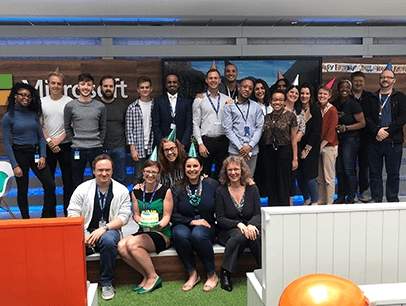One of the biggest shake-ups in the post-pandemic business world has been the soaring demand for workers with an expanded range of skills, including some that were not as vigorously sought after in past years as they are now.
The technical and professional knowledge needed to perform a job are still a given. However, employers are now looking beyond practical experience and into more wide-ranging skills rooted in behaviors and personalities. Employees who excel at behavioral traits are most likely to demonstrate empathy, innovation, cultural responsibility, curiosity, ethical conduct, positivity, and many other talents that are vital in a global economy. This expanded view has led to clearer definitions for what have been known as soft and hard skills. The new terms are literal: durable or perishable.
What Are Durable Skills?
The nonprofit America Succeeds recently identified 10 core durable competencies now greatly in demand from today’s workers: communication, creativity, collaboration, character, mindfulness, self-awareness, leadership, growth mindset, fortitude, and critical thinking.
These skills are considered long-lasting and transferable across job descriptions and careers. Some—such as empathy and leadership—are inherent in many people, but they can also be learned and refined by those who don’t come by them naturally. And that’s where Toastmasters can step in.
Speaking clarity, active listening, considering viewpoints other than your own, impromptu speaking, supporting colleagues. Sound familiar? Toastmasters have been practicing and sharpening durable skills for nearly 100 years.
Durable skills are the type of talents that grow more polished with time and experience.
“Every single Toastmasters meeting is an exercise in teamwork, problem-solving, conflict management, creativity, and leadership,” says Nina John, DTM, director of coaching for Envy Communications, and a member of the Chennai Toastmasters Club in Chennai, Tamil Nadu, India. “Organizing meetings, recruiting for roles, creating an agenda—all offer invaluable practice.”
Toastmasters’ education has clear relevance for companies that seek durable skills but may not have boundless training budgets, adds Linda Patten, DTM, a veteran corporate trainer and member of Heart2Heart and Leaders Worldwide, two online clubs based in Oakland, California.
Patten says that Toastmasters is a cost-effective option for companies to augment upskilling efforts. “It’s what we’re in the business of doing, right?” she says. Toastmasters clubs also allow companies to support an ongoing training program, rather than being forced to focus only on practical skills development when training budgets are tight. “Companies want instant change, and with durable skills, the change is more subtle than successful lines of code,” explains Patten, a member of the Forbes Coaching Council.
Durable Versus Perishable
Matthew Daniel, a principal consultant for Guild Education, headquartered in Denver, Colorado, uses the image of a tree to portray the concept of durable and perishable skills. The strong trunk represents fundamental and lasting capabilities, while the branches represent the continual sprouting of accepted industry knowledge that may stay relevant for several years. Perishable skills—often tied to technology—are the leaves, constantly growing and falling with change.
Perishable skills have a strikingly short life span of about two years, Daniel notes in an article for Chief Learning Officer magazine. Durable skills—which highlight character traits and innovative mindsets—are viable for about seven years and foster talents that grow more polished with time and experience. Human resource experts also now see that durable skills, once considered vague, unteachable, and unmeasurable, are identifiable in the hiring process.
“These are some of the most teachable, and practice-able skills,” says John, who is also the author of Navigating Corporate Seas. For example, the ability to clearly express ideas, listen carefully, and consider different points of view “are essential to structuring productive client and staff meetings that yield results.” And meetings, regardless of the format, are almost sacrosanct in business.
Gordon Pelosse, a member of the Forbes Human Resources Council, recalls participating in an employer-organized research exercise to see if the desired durable skills would show up in job candidates whose resumes already verified technical and academic qualifications. Candidates were asked to make a brief presentation, using their choice of topic and communication approach.
Within a short time, Pelosse says, a number of candidates were authentically showing initiative, enthusiasm, curiosity, critical thinking, knowledge about the company they were interviewing with, and other desired attributes. The potential hires were quickly obvious.
Another factor in the demand for durable skills is, ironically, the explosive growth of technology. There is a complex interdependence between primarily technology-skilled workers and those who are adept at applying talents such as negotiation, analysis, mindfulness, and cultural intelligence. To be successful, cross-functional teams from diverse areas of the company need to be armed with behavioral and technical skills. While not every person will excel at every required skill, the team together can represent 100% proficiency, or greater.
The Toastmasters Boost
Toastmasters specializes in developing skills, so if you or someone you know needs a boost, you’ve come to the right place. The Pathways learning experience, for example, trains 300 competencies across 11 specialized learning paths, with complete and select translations available in 12 languages.
Additionally, club roles are time-tested and tailored to train behavior-oriented talents. For example, leadership responsibilities and time management? That’s the Toastmaster of the Day. The timer, grammarian, and Ah-Counter learn to listen, collect details about meeting elements such as speech timing and language usage, and share at the end of each meeting, so everyone can learn from their observations. Table Topics® foster creativity, quick thinking, self-awareness, and much more. Evaluators gain real confidence in their critical-thinking assessments and the ability to share—as well as receive—constructive feedback.
Toastmasters helps members polish what John calls “some of the most essential skills in the workplace,” including communication, teamwork, and time management. “I would rate these three among the highest, since roles, tasks and responsibilities must be clearly assigned and understood.” These skills are practiced in every club meeting.
Toastmasters’ education has clear relevance for companies that seek durable skills but may not have boundless training budgets.
Club meetings give everyone endless opportunities to practice all types of speaking—from humor to personal to persuasive—and members get to hear a wide variety of perspectives, which encourages diversity and inclusion, she adds.
Additionally, officer and other leadership positions offer real-life responsibilities in positions from the local club to international levels.
Durable Skills in the Business World
In John’s opinion, practice makes progress, especially when expanding skills to keep one’s proficiency profile high above perishable status. Even experienced staff members need upskilling to react knowledgeably in continually changing business environments. “I work with clients who are generally very experienced but they’re still looking to raise their presentation skills for global audiences,” says John.
Lanie Denslow, founder of World Wise Intercultural Training and Resources, in Northern California, and a member of BAWOM Toastmasters in Oakland, California, agrees workers will need the know-how to function capably in an increasingly global workplace. “When it comes to durable skills, I think communication and collaboration are essential no matter where you are in the world,” she says.
John trains clients for a variety of proficiencies, including vocabulary, structuring of material, storytelling talents, and voice modulation. Empathy and civility, perhaps once undervalued in business, set a baseline for successful interaction. People need to communicate clearly—a critical element any time people work together. John sees more leaders working on interpersonal communication skills these days. “Many of my clients are also looking for better ways to relate to staff members or colleagues, or to have better outcomes with difficult conversations.” she says.
Without question, the demand for technical and academic training will always be important. However, the new work world is also placing a high priority on capabilities that favor thoughtful, collaborative, engaged, and empathic leaders. These skills, once considered “soft,” are now considered vital.
Alexandra Levit, author of Humanity Works: Merging Technology and People for the Workforce of the Future, puts it like this: “Durable skills ensure career durability.”
Stephanie Darling is a former senior editor of and frequent contributor to the Toastmaster magazine.



 Previous
Previous

 Previous Article
Previous Article


